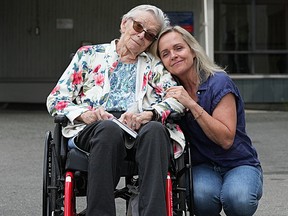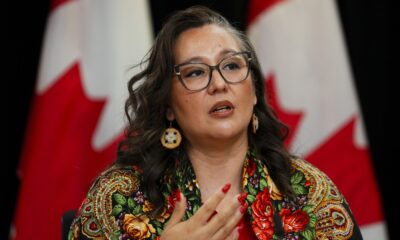Health
Victoria Woman Faces Two-Year Wait for Long-Term Care Bed

Barbara Donaldson, an 84-year-old woman from Victoria, British Columbia, has spent the last six months in a hospital bed, waiting for a long-term care placement. Her situation highlights a growing crisis in the region’s healthcare system, as the Vancouver Island Health Authority informs her family that the wait could extend for up to two years.
Donaldson suffers from advanced Parkinson’s disease and requires specialized care that is not available in her current transitional facility. Her daughter, Laura Kyle, has been advocating tirelessly for her mother’s needs, expressing frustration at the lack of urgency and resources dedicated to the care of seniors. “I have raised my fist and shouted from the hilltop within the system to try to raise awareness and get something different for my mom, something better for my mom, and it has just been met with roadblocks,” Kyle stated.
In a recent report, Dan Levitt, British Columbia’s seniors advocate, revealed that the waiting list for long-term care has surged from 2,381 people in 2016 to 7,212 in 2025, representing a staggering 200 percent increase. The average waiting time has also risen, now averaging 290 days compared to 146 days six years ago. Levitt pointed out that many hospital beds are occupied by seniors who are unable to care for themselves at home, contributing to a situation that strains both hospital resources and patient care.
According to Jennifer Baumbusch, a professor at the University of British Columbia’s School of Nursing, the crisis has been anticipated for decades. “If we had built places 20 years ago, we’d be in good shape, but that wasn’t done,” she said, emphasizing the need for substantial investments in both long-term care facilities and community-based care options.
Donaldson’s journey to secure appropriate care has been fraught with challenges. After her condition deteriorated last summer, it became clear that her independent living arrangement at Amica Senior Lifestyles was no longer sufficient. Despite the existence of long-term care facilities operated by the same provider, the cost of $18,000 per month was prohibitive.
In November, Kyle was informed that placing her mother in private long-term care could qualify her for Island Health’s priority placement list, based on financial need. This would allow Donaldson to transition to a publicly subsidized long-term care facility within a few months. However, her plans were derailed following a medical emergency in February that required her mother to stay in the hospital for six weeks.
After the situation escalated, Kyle sought to place Donaldson in Amica’s long-term care facility temporarily while pursuing the priority placement. Unfortunately, Island Health later announced that the option for priority placement based on financial need had been suspended.
Kyle faced additional hurdles when Island Health suggested providing a 24/7 care aide to allow Donaldson to remain in her independent living suite. Following her adjustments to accommodate a separate sleeping space, the promised support was repeatedly downgraded. Eventually, she was informed that no home care could be provided at all. By this point, Donaldson had remained in the hospital longer than expected, leading to cognitive decline and hallucinations.
Months passed with little progress. Kyle received information about a potential placement in a convalescent home, only for authorities to determine that it was unsuitable for someone with Donaldson’s degenerative condition. A transitional program called STEPS was also mentioned, but it no longer existed, adding to the confusion and frustration.
Eventually, Donaldson was placed in the transitional wing of the Gorge Road Health Centre, but Kyle asserts that the environment feels more like a hospital than a home. With only one day of programming each week, her mother’s mental health continues to deteriorate. Kyle worries about the implications of this broken system for her family members who may also need care in the future.
“I can’t help but wonder how many others are in the same situation, waiting for over two years for long-term care,” Kyle said, reflecting on the broader implications of the current crisis. “What’s their state going to be within this broken system?”
As the healthcare landscape in British Columbia continues to evolve, the need for urgent reforms in long-term care accessibility remains evident. Without significant changes, many families may find themselves facing similar struggles as they navigate the complexities of care for aging loved ones.
-

 Politics4 weeks ago
Politics4 weeks agoSecwepemc First Nation Seeks Aboriginal Title Over Kamloops Area
-

 World5 months ago
World5 months agoScientists Unearth Ancient Antarctic Ice to Unlock Climate Secrets
-

 Entertainment5 months ago
Entertainment5 months agoTrump and McCormick to Announce $70 Billion Energy Investments
-

 Science5 months ago
Science5 months agoFour Astronauts Return to Earth After International Space Station Mission
-

 Lifestyle5 months ago
Lifestyle5 months agoTransLink Launches Food Truck Program to Boost Revenue in Vancouver
-

 Technology3 months ago
Technology3 months agoApple Notes Enhances Functionality with Markdown Support in macOS 26
-

 Lifestyle3 months ago
Lifestyle3 months agoManitoba’s Burger Champion Shines Again Amid Dining Innovations
-

 Top Stories2 months ago
Top Stories2 months agoUrgent Update: Fatal Crash on Highway 99 Claims Life of Pitt Meadows Man
-

 Politics4 months ago
Politics4 months agoUkrainian Tennis Star Elina Svitolina Faces Death Threats Online
-

 Sports5 months ago
Sports5 months agoSearch Underway for Missing Hunter Amid Hokkaido Bear Emergency
-

 Politics5 months ago
Politics5 months agoCarney Engages First Nations Leaders at Development Law Summit
-

 Technology5 months ago
Technology5 months agoFrosthaven Launches Early Access on July 31, 2025





















